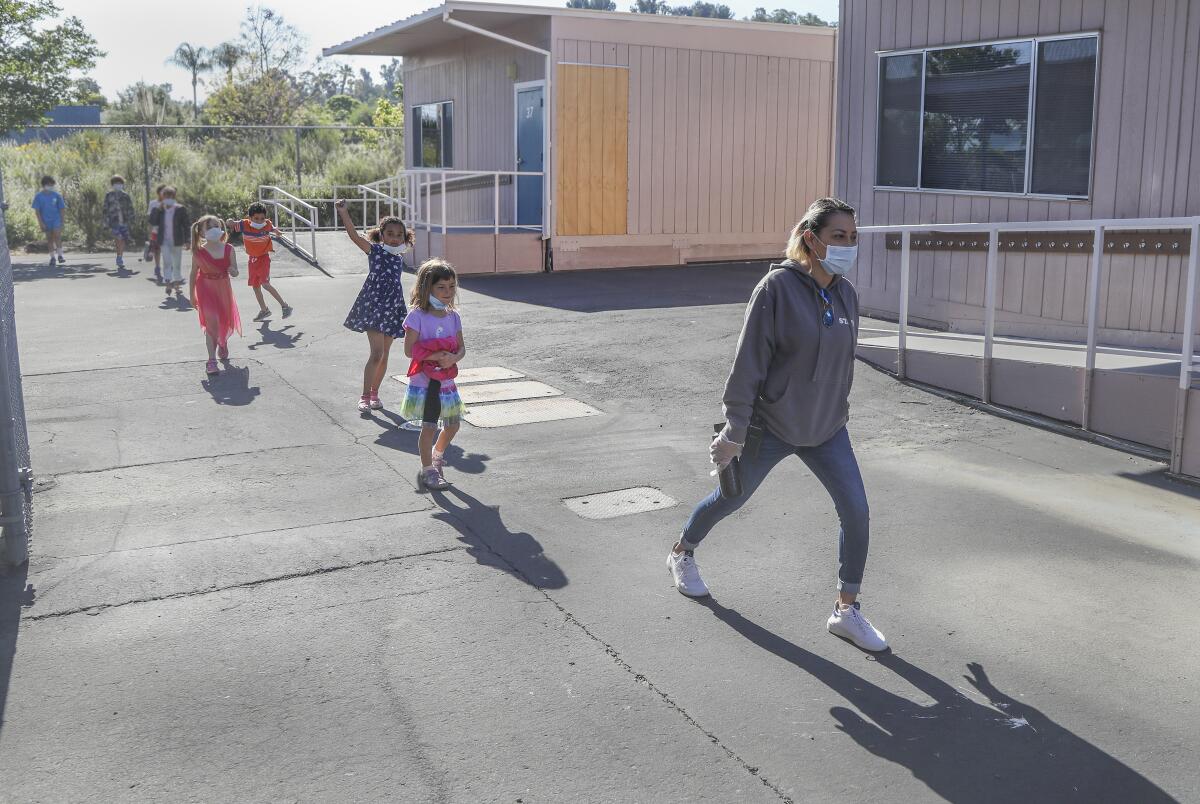Editorial: Hey, Congress, this time bail out child-care providers

Maybe, just maybe, Congress is finally getting serious about helping parents get back to work.
There’s growing bipartisan support among lawmakers for a major relief package that could help child-care providers meet the enormous coronavirus-related challenges that have forced some centers to suspend operations and left others barely hanging on. The ongoing pandemic could cause roughly 40% of child-care facilities to close permanently, according to a survey of 5,000 providers. If they go down, so will the prospects of working parents and the economy — parents with minor children make up almost one-third of the nation’s workforce.
The fundamental problem is that in the current environment, child-care providers lose money whenever they open their doors. To help minimize exposure and contain outbreaks, facilities are limited to 10 kids per classroom no matter the age, down from 24 in classrooms with older children. Typically, providers need to have 80% of their seats filled to make a profit, but they’re required now to operate at 40% to 60% capacity.
They still need teachers to oversee those smaller classes. And they need aides to escort children into their facilities because parents are required to drop kids off outside.
Then there are the added expenses to make child-care centers safer, including masks, face shields, gloves, thermometers and cleaning supplies. And they need more toys because kids can’t share them anymore. The Centers for Disease Control and Prevention recommended sanitizing toys immediately after a child puts it in his or her mouth, or sneezes or coughs on it. The cleaning regimen is so intense, operators may need extra employees just to keep up.
And they can’t cut corners on safety measures. While children may be less likely than their parents and teachers to develop severe illness from the coronavirus, they can still be infected and transmit the virus to other people. Texas repealed its emergency safety rules for child-care providers in mid-June, but reinstated the measures (including daily temperature checks of staff and children) after a surge in COVID-19 cases connected to child-care facilities.
Unlike K-12 public education, child care in the U.S. is largely a private industry, with operators that rely on fees paid by customers to stay afloat. If parents aren’t working or don’t feel comfortable sending their children back to day care, then these facilities can’t open or stay open.
In Los Angeles County, about 65% of child-care centers are closed. These tend to be the larger providers with multiple classrooms and teachers, and they are struggling to make the economics work with the coronavirus guidelines and smaller classes.
At the Wishing Well Academic Preschool in the San Fernando Valley, Delynn Schneider said her family-owned day-care center dropped from 80 kids to 12 at the beginning of the pandemic. She had to lay off almost her entire teaching staff. She was able to stay open only with the help of a federal Paycheck Protection Program loan and the subsidies the state offered for low-income enrollees, even if the children stayed home.
Now she’s up to 50 students, but the future is still uncertain as the subsidies expire. “It took us 17 years to build this program,” Schneider said.
The need for child care is only going to grow as more businesses call their employees back to work. Plus, more K-12 school districts are starting the new year online — meaning parents won’t have that vital source of child care. Notably, many campuses had also provided after-school programs that could watch kids until 6 p.m.
Parents — and their employers — need child care, and providers need government help to stay open and serve their mission. Yet so far, Congress and the Trump administration haven’t done nearly enough to help. The airlines got a $25-billion bailout. Child care got $3.5 billion.
But at least some lawmakers are getting the message. Nearly 100 House Democrats have co-sponsored the Child Care Is Essential Act, which would provide $50 billion for child-care providers during and after the pandemic. House Minority Leader Kevin McCarthy (R-Bakersfield) has called for aid for child-care facilities in the next pandemic relief bill, and two Republican senators, Joni Ernst of Iowa and Kelly Loeffler of Georgia, have proposed a $25-billion fund.
It’s a hopeful sign. Child care is too often an afterthought for the nation’s political leaders. But for families, safe and high-quality child care is truly essential.
More to Read
A cure for the common opinion
Get thought-provoking perspectives with our weekly newsletter.
You may occasionally receive promotional content from the Los Angeles Times.










